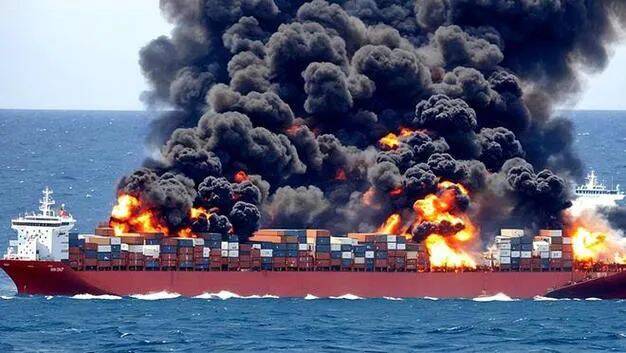U.S. warships under attack! Situation in the Red Sea will continue to affect coffee trade
According to media reports, recently, three US warships in the Red Sea region were attacked by missiles and drones launched by Houthi forces in Yemen, which the US military said had been intercepted. According to US officials, this is one of the largest attacks so far on US warships operating in the Middle East.
It is reported that Houthi armed destroyers "Spruance" (USS Spruance) and "Stockdale" destroyer (USS Stockdale) and "Indianapolis" heavy cruiser (USS Indianapolis) fired missile attacks, at that time, the three warships were northward in the Gulf of Aden across the Strait of Mander to the Red Sea.
After the attack, a spokesman for the Houthi armed forces said that the Houthi navy, air force and missile forces fired a total of 23 missiles and drones to attack the three US warships. He also said that the attacked US ships were "on their way to support Israel", but the Houthi claimed that all three warships were "directly hit".
However, the claim was denied by US officials and said that US Navy warships had intercepted several projectiles fired by Houthi forces in Yemen. According to preliminary information, these projectiles, including missiles and drones, did not cause damage to the three warships. No damage was reported to the warship.
Since the outbreak of a new round of Israeli-Palestinian conflict in October last year, in order to pressure Israel to stop its military operations in the Palestinian Gaza Strip, Houthi forces in Yemen have frequently attacked foreign merchant ships passing through the Red Sea. According to statistics, as of September, the Houthi have launched more than 70 attacks in the Red Sea, sinking two ships, hijacking another, damaging many ships and killing at least three seafarers.

The move forced multinational cargo ships and merchant ships to avoid attacks by avoiding the Suez Canal and bypassing the Cape of good Hope in South Africa, causing voyages to be delayed by 10 to 14 days and shortages of some products, driving up logistics costs in disguise. According to shipping giant Maersk, the impact of the Red Sea crisis on the global supply chain has expanded from the far East ─ European route to the world. With the continuous spillover of the Palestinian-Israeli conflict, the negative impact of the Red Sea crisis continues to expand, which has a great impact on all aspects of the lives of people in many countries.
The coffee trade is very dependent on shipping, so the coffee trade is also disturbed. As transportation distances and costs increase, many European buyers are buying coffee beans from Asia and turning to Brazil. But Brazilian production is limited after all, and since the Red Sea crisis, freight from Asia to Europe has risen nearly sevenfold to $4000 per container, leading to a sharp drop in shipments and a blow to coffee growers, according to Phuc Sinh Corp, a Vietnamese coffee exporter. And due to the rise in freight rates, coupled with a number of countries reported production cuts, international coffee prices have also risen wildly.
In addition, as the Red Sea is located in East Africa, a number of coffee-producing countries in East Africa have also reported significant impacts. It has been reported that the Djibouti port in the Gulf of Aden, which is mainly dominated by shipping company MSC, accounts for 80 per cent of the port's transport capacity. Earlier, MSC announced that it would completely suspend services at the port of Bukit. This has dealt a severe blow to the export of goods such as Ethiopian coffee, all because Ethiopia is a landlocked country and its seaborne exports are heavily dependent on the port of Djibouti.
Currently, according to the Swiss coffee trading giant Suncafina, due to the reduction of ships, resulting in serious cargo congestion at the port of Djibouti, affecting the shipping schedule and causing delays. In addition, Uganda, Kenya and Rwanda in East Africa are in the peak export season, but are currently reporting severe container shortages at Kenyan ports.
It is said that as the major shipping companies need more empty containers to meet the market demand, but because of the situation in the Red Sea, ships choose to make a detour to African ports such as the Cape of good Hope, Kenya and Tanzania. This has led to an increase in the cargo handling capacity of the Kenyan port, but there has been no corresponding increase in the port infrastructure, resulting in the accumulation of cargo and the continued congestion of port ships, resulting in a decline in the efficiency of port operations.
In addition, due to the EU's annual implementation of no deforestation regulations EUDR, many traders believe that many African countries are difficult to meet the requirements of the European Union, so they have increased their coffee imports, but shipping delays and shipping hours caused by the Red Sea have also led to a shortage of containers. And is about to enter the shipping season, but the market demand remains high, the situation in the Red Sea region is still grim, it is expected that by the end of this year, global supply will continue to be under pressure.
For more information about coffee producing areas, please scan the code directly and follow: coffee comments.
Long press the QR code to follow:

TRANSLATE with
XEnglishArabicHebrewPolishBulgarianHindiPortugueseCatalanHmong DawRomanianChinese SimplifiedHungarianRussianChinese TraditionalIndonesianSlovakCzechItalianSlovenianDanishJapaneseSpanishDutchKlingonSwedishEnglishKoreanThaiEstonianLatvianTurkishFinnishLithuanianUkrainianFrenchMalayUrduGermanMalteseVietnameseGreekNorwegianWelshHaitian CreolePersian
TRANSLATE with
COPY THE URL BELOW
BackEMBED THE SNIPPET BELOW IN YOUR SITE Bing Webmaster PortalBack
Important Notice :
前街咖啡 FrontStreet Coffee has moved to new addredd:
FrontStreet Coffee Address: 315,Donghua East Road,GuangZhou
Tel:020 38364473
- Prev

How can hand-brewed coffee highlight the sweetness? What does high concentration and low extract mean? What does the high intensity and low extract in hand-brewed coffee mean?
Even if the sweetness in coffee does not come entirely from sugar, this sweetness is enough to make us secrete pleasant dopamine, so everyone will always put "sweetness" first in their pursuit of coffee. In contrast, bitterness is the most unlikable taste, which makes us resist this cup of coffee and make it difficult to swallow.
- Next

The difference between Guodin and Yejia Xuefei is Ethiopia Guodin a production area? Is Guodin produced in Kocher or Godibe?
Yirgachefe was originally part of the sub-producing area of sidamo in Ethiopia. Because the flavor of the washed coffee beans it produced was too outstanding, it later became a large producing area. Elegant white floral fragrance, bright lemon fruit flavor, fresh green
Related
- What grade does Jamaica Blue Mountain No. 1 coffee belong to and how to drink it better? What is the highest grade of Blue Mountain coffee for coffee aristocrats?
- What are the flavor characteristics of the world-famous coffee Blue Mountain No. 1 Golden Mantelin? What are the characteristics of deep-roasted bitter coffee?
- Can I make coffee a second time in an Italian hand-brewed mocha pot? Why can't coffee be brewed several times like tea leaves?
- Hand-brewed coffee flows with a knife and a tornado. How to brew it? What is the proportion of grinding water and water temperature divided into?
- What is the difference between Indonesian Sumatra Mantinin coffee and gold Mantinin? How to distinguish between real and fake golden Mantelin coffee?
- What does bypass mean in coffee? Why can hand-brewed coffee and water make it better?
- Unexpected! Ruixing Telunsu lattes use a smoothie machine to foam milk?!
- % Arabia's first store in Henan opens into the village?! Netizen: Thought it was P's
- Does an authentic standard mocha coffee recipe use chocolate sauce or powder? Mocha Latte/Dirty Coffee/Salty Mocha Coffee Recipe Share!
- What is the difference between Vietnam egg coffee and Norway egg coffee? Hand-brewed single product coffee filter paper filter cloth filter flat solution!

